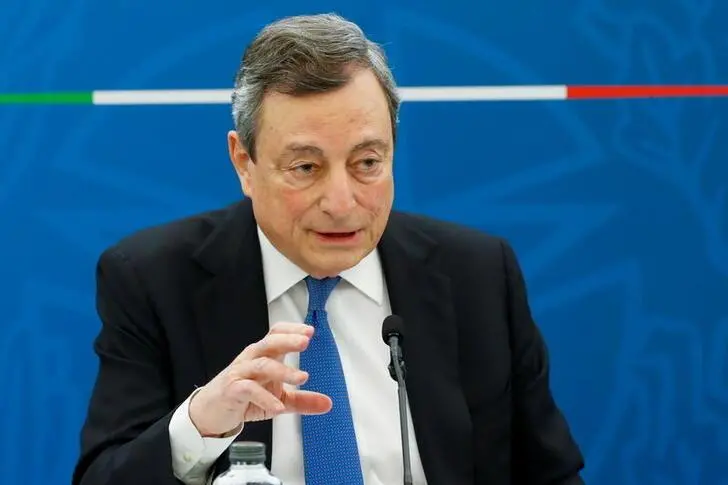PHOTO
ROME - Italy's parliament will make a fifth attempt to elect a new president on Friday, with the centre-right parties saying they will try to push through a candidate from their own ranks for the powerful role.
Prime Minister Mario Draghi remains a contender, but his prospects have faded this week, with many lawmakers clearly reluctant to back him, partly because they fear any change to the government could trigger an early election.
Much is at stake. The Italian presidency comes with a seven-year mandate and has considerable power to resolve political crises that regularly batter the country, including appointing prime ministers and dissolving parliament.
After a meeting late on Thursday the bloc of conservative parties said in Friday's ballot it would instruct its lawmakers to vote for one of three candidates it had proposed earlier this week but which were rejected by the centre-left.
It remains to be seen whether this confrontational approach will be successful, as the centre-right lacks the votes to elect the president on its own and must rely on unaffiliated lawmakers or centre-left defectors in the secret ballot.
Voting starts at 1000 GMT.
Earlier, Matteo Salvini, the leader of the rightist League, had promised to seek consensus with the centre-left.
The three rightist candidates are Marcello Pera, a former Senate speaker, Letizia Moratti, a former mayor of Milan, and Carlo Nordio, a retired magistrate.
The conservative parties will hold another meeting at 0800 GMT on Friday to decide which of these names to support.
In contradictory remarks after Thursday night's meeting Salvini, who is leading negotiations for the centre-right, said the bloc might instead support current Senate speaker Elisabetta Casellati.
"They have given me a mandate to find high level figures who will get wide backing ... I am confident that tomorrow (Friday) there will be a breakthrough," he said.
LACK OF TRUST
Enrico Letta, leader of the centre-left Democratic Party, said on Friday that the right could not longer be trusted.
"They have taken us for a ride for the last three days," he told reporters ahead of a centre-left meeting in parliament.
While Draghi's hopes have dimmed somewhat, there seems to be a rising possibility that Sergio Mattarella will be elected for another mandate even though the outgoing president, who is 80, has so far ruled this out.
Neither the centre-right nor centre-left groups put forward any names for Thursday's vote - the fourth this week - after various parties had shot down a raft of possible contenders, opening the way for intense, behind-the-scenes haggling.
With tempers fraying after four inconclusive days, party representatives will meet at 0915 GMT to decide whether to hold two rounds of voting per day from Friday, instead of one.
Unlike in the United States or France, where presidents get elected in a popular vote, in Italy some 1,009 parliamentarians and regional representatives pick the head of state in a secret ballot, which party leaders sometimes struggle to control.
If the right fails to push through its own candidate on Friday, some sort of compromise will be necessary in the fragmented parliament where neither of the main blocs has a majority.
Two government members told Reuters on Thursday that the re-election of Mattarella was a strong possibility.
Even though the main party chiefs instructed their lawmakers to abstain or cast blank ballots in Thursday's ballot, Mattarella still got 166 votes, more than anyone else for the second day running, though well below the required 505.
Aside from Draghi and Mattarella, numerous other candidates are cited for the job, often only to be shot down by one side or the other in a matter of hours.
These include Elisabetta Belloni, a career diplomat who heads the secret services, and Sabino Cassese, an 86-year-old former constitutional court judge.
Other possible contenders floated in the media include former lower house speaker Pier Ferdinando Casini, former premier Giuliano Amato, Senate speaker Elisabetta Casellati and
Justice Minister Marta Cartabia, who previously chaired the constitutional court.
((gavin.jones@thomsonreuters.com; +39 06 8522 4232;))





















